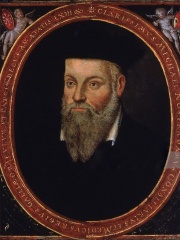
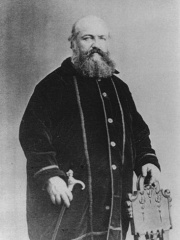
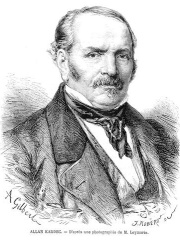

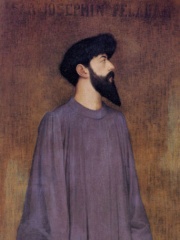
The Most Famous
OCCULTISTS from France
This page contains a list of the greatest French Occultists. The pantheon dataset contains 41 Occultists, 6 of which were born in France. This makes France the birth place of the 2nd most number of Occultists.
Top 6
The following people are considered by Pantheon to be the most legendary French Occultists of all time. This list of famous French Occultists is sorted by HPI (Historical Popularity Index), a metric that aggregates information on a biography's online popularity.

1. Nostradamus (1503 - 1566)
With an HPI of 86.64, Nostradamus is the most famous French Occultist. His biography has been translated into 101 different languages on wikipedia.
Michel de Nostredame (December 1503 – July 1566), usually Latinised as Nostradamus, was a French astrologer, apothecary, physician, and reputed seer, who is best known for his book Les Prophéties (published in 1555), a collection of 942 poetic quatrains allegedly predicting future events. Nostradamus's father's family had originally been Jewish, but had converted to Catholic Christianity a generation before Nostradamus was born. He studied at the University of Avignon, but was forced to leave after just over a year when the university closed due to an outbreak of the plague. He worked as an apothecary for several years before entering the University of Montpellier, hoping to earn a doctorate, but was almost immediately expelled after his work as an apothecary (a manual trade forbidden by university statutes) was discovered. He first married in 1531, but his wife and two children died in 1534 during another plague outbreak. He worked against the plague alongside other doctors before remarrying to Anne Ponsarde, with whom he had six children. He wrote an almanac for 1550 and, as a result of its success, continued writing them for future years as he began working as an astrologer for various wealthy patrons. Catherine de' Medici became one of his foremost supporters. His Les Prophéties, published in 1555, relied heavily on historical and literary precedent, and initially received mixed reception. He suffered from severe gout toward the end of his life, which eventually developed into edema. He died on 1 or 2 July 1566. Many popular authors have retold apocryphal legends about his life. In the years since the publication of his Les Prophéties, Nostradamus has attracted many supporters, who, along with some of the popular press, credit him with having accurately predicted many major world events. Academic sources reject the notion that Nostradamus had any genuine supernatural prophetic abilities and maintain that the associations made between world events and Nostradamus's quatrains are the result of (sometimes deliberate) misinterpretations or mistranslations. These academics also argue that Nostradamus's predictions are characteristically vague, meaning they could be applied to virtually anything, and are useless for determining whether their author had any real prophetic powers.

2. Éliphas Lévi (1810 - 1875)
With an HPI of 75.65, Éliphas Lévi is the 2nd most famous French Occultist. His biography has been translated into 37 different languages.
Éliphas Lévi Zahed, born Alphonse Louis Constant (8 February 1810 – 31 May 1875), was a French esotericist, poet, and writer. Initially pursuing an ecclesiastical career in the Catholic Church, he abandoned the priesthood in his mid-twenties and became a ceremonial magician. At the age of 40, he began professing knowledge of the occult. He wrote over 20 books on magic, Kabbalah, alchemical studies, and occultism. The pen name "Éliphas Lévi" was an adaptation of his given names "Alphonse Louis" into Hebrew. Levi gained renown as an original thinker and writer, his works attracting attention in Paris and London among esotericists and artists of romantic or symbolist inspiration. He left the Grand Orient de France (the French Masonic organization that originated Continental Freemasonry) in the belief that the original meanings of its symbols and rituals had been lost. "I ceased being a freemason, at once, because the Freemasons, excommunicated by the Pope, did not believe in tolerating Catholicism ... [and] the essence of Freemasonry is the tolerance of all beliefs." Many authors influenced Levi's political, occultic and literary development, such as the French monarchist Joseph de Maistre (whom he quotes in many parts of his Dogme et Rituel de la Haute Magie), Paracelsus, Robert Fludd, Swedenborg, Fabre d'Olivet, the Rosicrucians, Plato, Raymond Lull, and other esotericists.

3. Allan Kardec (1804 - 1869)
With an HPI of 73.24, Allan Kardec is the 3rd most famous French Occultist. His biography has been translated into 40 different languages.
Hippolyte Léon Denizard Rivail ([ʁivaj]; 3 October 1804 – 31 March 1869), known by the pen name of Allan Kardec (French: [kaʁdɛk]), was a French educator, translator, and writer. He is the author of the five books known as the Spiritist Codification, and the founder of Spiritism.

4. Louis Claude de Saint-Martin (1743 - 1803)
With an HPI of 65.17, Louis Claude de Saint-Martin is the 4th most famous French Occultist. His biography has been translated into 20 different languages.
Louis Claude de Saint-Martin (18 January 1743 – 14 October 1803) was a French philosopher, known as le philosophe inconnu ("the unknown philosopher"), the name under which his works were published. He was an influential Christian mystic whose legacy, together with that of his mentor Martinez de Pasqually, inspired the founding of the Martinist Order. Léonce de Saint-Martin, composer and organist, was a distant relative of Louis-Claude de Saint-Martin.
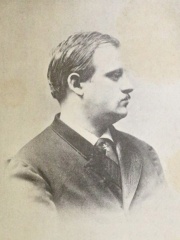
5. Stanislas de Guaita (1861 - 1897)
With an HPI of 63.58, Stanislas de Guaita is the 5th most famous French Occultist. His biography has been translated into 20 different languages.
Stanislas de Guaita (6 April 1861, Tarquimpol, Moselle – 19 December 1897, Tarquimpol) was a French poet based in Paris, an expert on esotericism and European mysticism, and an active member of the Rosicrucian Order. He was very celebrated and successful in his time. He had many disputes with other people who were involved with occultism and magic. Occultism and magic were part of his novels.

6. Joséphin Péladan (1858 - 1918)
With an HPI of 63.42, Joséphin Péladan is the 6th most famous French Occultist. His biography has been translated into 23 different languages.
Joséphin Péladan (28 March 1858 – 27 June 1918) was a French novelist and Rosicrucian who later briefly joined the Martinist order led by Papus (Gérard Encausse). His father was a journalist who had written on prophecies, and professed an esoteric-aesthetic form of Rosicrucianism and universalist Catholicism. He established the Salon de la Rose + Croix for painters, writers, and musicians sharing his artistic ideals, the Symbolists in particular.
People
Pantheon has 6 people classified as French occultists born between 1503 and 1861. Of these 6, none of them are still alive today. The most famous deceased French occultists include Nostradamus, Éliphas Lévi, and Allan Kardec.
Deceased French Occultists
Go to all RankingsNostradamus
1503 - 1566
HPI: 86.64
Éliphas Lévi
1810 - 1875
HPI: 75.65
Allan Kardec
1804 - 1869
HPI: 73.24
Louis Claude de Saint-Martin
1743 - 1803
HPI: 65.17
Stanislas de Guaita
1861 - 1897
HPI: 63.58
Joséphin Péladan
1858 - 1918
HPI: 63.42
Overlapping Lives
Which Occultists were alive at the same time? This visualization shows the lifespans of the 5 most globally memorable Occultists since 1700.

